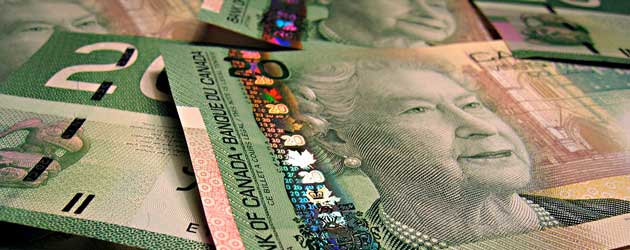
The Pound to Canadian Dollar exchange rate (GBP/CAD) strengthened moderately yesterday from 1.6290 to 1.6310 as traders anticipated that this afternoon’s Canadian GDP report will not reflect positively on the domestic economy.
The market consensus suggests that the Canadian economy shrunk by -0.4% in June, which will bring the annualised second quarter GDP score down to 1.6%, from 2.5% in Q1. A disappointing result of this nature is likely to reduce demand for the ‘Loonie’.
So far this week the Canadian Dollar has been buffeted by the burgeoning geopolitical conflict in Syria, which drove crude oil prices higher as traders began to envision potential problems with the Middle Eastern supply line. As Canada’s largest export, crude oil is very important to the value of the Canadian Dollar and the recent ‘black gold’ rallies have taken CAD higher by around 0.7 cents against the Pound.
However, last week the ‘Loonie’ fell to a 3-year low of 1.6512 against Sterling as Canadian Retail Sales printed pessimistically at -0.6% and CPI inflation underwhelmed at 1.3%.
As a commodity-correlated currency the Canadian Dollar is closely linked to global risk sentiment and regardless of the Syrian conflict, the ‘Loonie’ is likely to depreciate if the Federal Reserve opts to slowdown its asset purchasing programme in September. The general mood among analysts is that, barring a shockingly bad US Non-farm Payrolls report next Friday, the Federal Reserve will announce a moderate taper of between $10-$25 billion next month.
Yesterday US annualised second quarter GDP printed at 2.5%, smashing expectations of 2.2%, which was seen to improve the possibility of the ‘Septaper’ and could intensify CAD’s losses this afternoon if domestic GDP comes in at a depressed level.
Next Wednesday’s Bank of Canada Rate decision is basically a non-decision and the current interest rate of 1.00% is almost certainly going to be upheld. The same goes for next Thursday’s Bank of England rate decision, with markets widely predicting that the UK Central Bank will hold the benchmark interest rate at 0.50% and refrain from adding to the current quantitative easing target of £375 billion.
With UK 10-year government bond yields now at a 2-year high, in anticipation of an interest rate hike from the BoE before 2016, it is entirely possible that the Pound to Canadian Dollar exchange rate (GBP/CAD) could post another 3-year high above 1.6512 in the near future. However, if Western military intervention in Syria becomes a more realistic proposition – if the situation escalates – then it is possible that increased demand for crude oil could prop-up the ‘Loonie’ and prevent GBP/CAD from reaching a fresh peak.

Comments are closed.